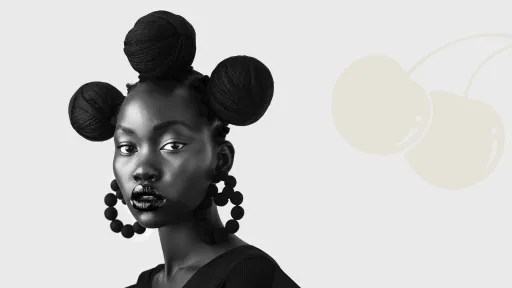
Not long ago, a little girl stood before a mirror in a bustling township in Nairobi, her mother gently undoing her cornrows. In the next room, a beauty advertisement played on television, featuring sleek hair, porcelain skin, and a look far removed from that which she saw reflected back at her. She tilted her head and whispered, “Mama mimi ni mrembo” meaning ‘Mama I am pretty.’
Today, that same little girl might scroll through her phone, seeing African models with rich melanin, voluminous kinks, wide noses, and proud tribal markings, boldly declaring, “I am enough.”
This is the quiet beauty revolution happening across Africa. A revolution not marked by protests, but by presence. African women are taking up space in beauty aisles, fashion runways, boardrooms, and digital feeds, reshaping what it means to be beautiful, inspired by their culture and whole selves.
For decades, African beauty was filtered through the lens of European standards. Straightened hair, fairer skin, slimmer noses, these were the benchmarks, often reinforced by mainstream media, colonial residue, and commercial advertising.
But as African women began to own their narratives, the mirror changed. Instead of imitating, they began defining.
In Lagos, stylists now create avant-garde hairstyles inspired by Yoruba traditions. In Kigali, natural hair salons celebrate tightly coiled textures, and Amasunzu inspires some, including Kenyan actress Lupita Nyong’o. Lupita occasionally steps onto the red carpet with a jaw-dropping hairdo, all thanks to Vernon François, a US-based hairstylist who has made it clear that he is on a mission to celebrate African cultures by showcasing the star’s natural hair, drawing its heritage from Rwanda. She wore the same hairstyle at the Oscars 2018 and the Vanity Fair party.
In Accra, dark-skinned models command fashion campaigns with regal elegance. From Dar es Salaam to Dakar, women are saying: “My beauty is not a variation of someone else’s. It is its own masterpiece.”
This redefinition is not just about looks, it’s about liberation. It’s the freedom to choose how to show up in the world, and that confidence radiates far beyond skin and style.
Take Susan Achieng, a young entrepreneur in Nairobi who started a skincare brand using indigenous African ingredients like baobab and moringa. “I grew tired of products that promised to ‘lighten’ or ‘correct’ my skin. I wanted something that celebrated it.”
Or Fatoumata Konte, a Senegalese fashion designer whose entire line is built around fuller-figured African silhouettes. “For so long, we were told to shrink our bodies, our voices. But African beauty is abundant. Our hips, our laughter, our stories, they are meant to take up space.”
The digital age has given African women a platform, and they are using it with grace and grit. Platforms like Instagram, TikTok, and YouTube have become stages for beauty creators, natural hair influencers, and self-love advocates across the continent.
Suddenly, a girl in Goma can learn skincare tips from a vlogger in Cape Town. A student in Lusaka can find makeup tutorials for her deep skin tone. And a teen in Mogadishu can connect with body positivity movements in Soweto.
These are not just trends. They are affirmations. And they are reaching millions, proving that
African women are no longer just consumers of beauty. They are producers, creators, and leaders in it.
In Rwanda, women-led cooperatives are producing essential oils and shea butter for international In South Africa, beauty tech startups are developing apps that match users with products suited to African skin tones. Some notable examples include ‘Zuri’, a pan-African beauty startup focused on hair products and cosmetics, and ‘Swiitch Beauty’, a digital makeup brand.
In Ethiopia, traditional kohl and natural henna are being reimagined by young creatives into modern cosmetics.
The global industry is watching. And for once, it’s not dictating; it’s learning. So, what does the future of beauty look like? In Ivory Coast, the national beauty pageant recently banned artificial hair for all contestants, allowing them to appear more naturally African. In Kampala, young corporates are rocking afro puffs to work.
Plus-sized African models are redefining runway standards. Makeup lines in Lusaka are naming their products “Nubian Glow” and “Savannah Sunset,” inspired by their African-ness, and it is stunning. African women are now changing the world with their own definition of African beauty.
Disclaimer:
This article reflects the author’s informed perspective, developed through independent research and publicly available sources. While every effort has been made to ensure accuracy and relevance, the content is intended for informational and discussion purposes only and should not be considered a substitute for professional advice. We welcome your thoughts, questions, and feedback as we strive to create meaningful content for our community. Please feel free to contact us at hello@thebeautymarche.com.